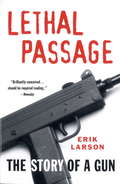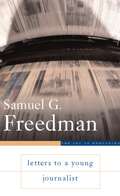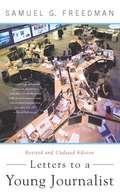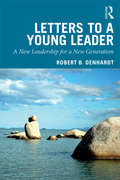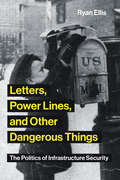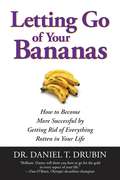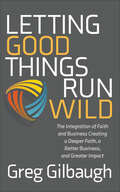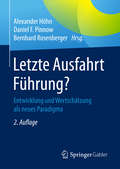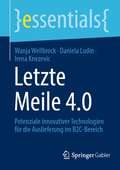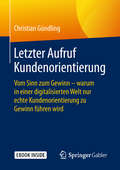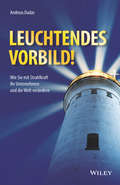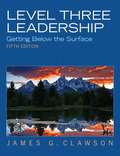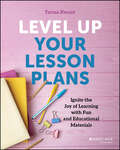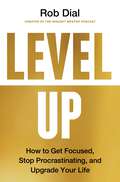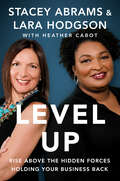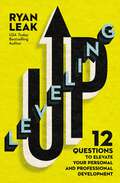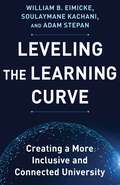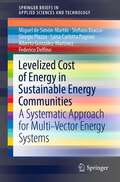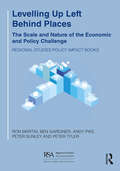- Table View
- List View
Lethal Passage: The Story of a Gun
by Erik LarsonThis devastating book illuminates America's gun culture -- its manufacturers, dealers, buffs, and propagandists -- but also offers concrete solutions to our national epidemic of death by firearm. It begins with an account of a crime that is by now almost commonplace: on December 16, 1988, sixteen-year-old Nicholas Elliot walked into his Virginia high school with a Cobray M-11/9 and several hundred rounds of ammunition tucked in his backpack. By day's end, he had killed one teacher and severely wounded another.In Lethal Passage Erik Larson shows us how a disturbed teenager was able to buy a weapon advertised as "the gun that made the eighties roar." The result is a book that can -- and should -- save lives, and that has already become an essential text in the gun-control debate.With a new afterword."Touches on all aspects of the gun issue in this country. Gives great voice to that feeling...that something real must be done." --San Diego Union-Tribune"One of the most readable anti-gun treatises in years." --Washington Post Book World
Letters to a Young Artist: Straight-up Advice on Making a Life in the Arts-For Actors, Performers, Writers, and Artists of Every Kind
by Anna Deavere SmithAn inspiring and no-nonsense guide for aspiring artists of all stripes—from &“the most exciting individual in American theater&” (Newsweek). In vividly anecdotal letters to the young BZ, Anna Deavere Smith addresses the full spectrum of issues that all artists starting out will face: from questions of confidence, discipline, and self-esteem, to fame, failure, and fear, to staying healthy, presenting yourself effectively, building a diverse social and professional network, and using your art to promote social change. At once inspiring and no-nonsense, Letters to a Young Artist will challenge you, motivate you, and set you on a course to pursue your art without compromise.
Letters to a Young Journalist
by Samuel J. FreedmanOver the course of a thirty-year career, Samuel Freedman has excelled both at doing journalism and teaching it, and he passionately engages both of these endeavors in the pages of this book. As an author and journalist, Freedman has produced award-winning books, investigative series, opinion columns, and feature stories and has become a specialist in a wide variety of fields. As a teacher, he has shared his expertise and experience with hundreds of students, who have gone on to succeed in both print and broadcast media. In Letters to a Young Journalist, Freedman conducts an extended conversation with young journalists-from kids on the high school paper to graduates starting their first jobs. Whether he's talking about radio documentaries or TV news shows, Internet blogs, or backwater beats, shoeleather research or elegant prose, his goal is to explore the habits of mind that make an excellent journalist. It is no secret that journalism's mission is seriously imperiled these days, and Freedman's provocative ideas and fascinating stories offer students and journalists at all levels of experience wise guidance and professional inspiration.
Letters to a Young Journalist, Revised and Updated Edition
by Samuel G. FreedmanOver the course of a thirty-year career, Samuel Freedman has excelled both at doing journalism and teaching it, and he passionately engages both of these endeavors in the pages of this book. As an author and journalist, Freedman has produced award-winning books, investigative series, opinion columns, and feature stories and has become a specialist in a wide variety of fields. As a teacher, he has shared his expertise and experience with hundreds of students, who have gone on to succeed in both print and broadcast media. In Letters to a Young Journalist, Freedman conducts an extended conversation with young journalists-from kids on the high school paper to graduates starting their first jobs. Whether he's talking about radio documentaries or TV news shows, Internet blogs, or backwater beats, shoeleather research or elegant prose, his goal is to explore the habits of mind that make an excellent journalist. It is no secret that journalism's mission is seriously imperiled these days, and Freedman's provocative ideas and fascinating stories offer students and journalists at all levels of experience wise guidance and professional inspiration.
Letters to a Young Leader: A New Leadership for a New Generation
by Robert B. DenhardtIf you are interested in becoming a better leader, this book is a great place to start. Rather than using the familiar textbook approach, leadership expert Robert Denhardt offers practical lessons drawn from a lively year-long correspondence with two (fictional) former students about their experiences in leadership. The letters explore the deeply personal issues these and other young and emerging leaders are facing – what the skills and personal qualities are that you need for contemporary leadership, what will leadership mean to you and those you lead, and even why or why not you might want to become a leader. Along the way, the book speaks to the big picture, arguing that leadership today has been stripped of its historic contribution to creating meaningful human experience and has been reduced to a technical exercise in executive management. Based on his experience of teaching leadership to thousands of undergraduates, graduate students, and advanced practitioners, Denhardt speaks person-to-person with young leaders about their questions and their concerns as they enter into the somewhat flawed world of leadership today. The result is a call for a new leadership for a new generation. This book will be valuable to students enrolled in regular and executive degree programs in leadership, business management, public administration, nonprofit management, educational administration, and many other fields. It also speaks to young leaders out of school but committed to enhancing their leadership. Indeed, readers of all ages will learn lessons relevant to their own professional development.
Letters, Power Lines, and Other Dangerous Things: The Politics of Infrastructure Security (Infrastructures)
by Ryan EllisAn examination of how post-9/11 security concerns have transformed the public view and governance of infrastructure.After September 11, 2001, infrastructures—the mundane systems that undergird much of modern life—were suddenly considered “soft targets” that required immediate security enhancements. Infrastructure protection quickly became the multibillion dollar core of a new and expansive homeland security mission. In this book, Ryan Ellis examines how the long shadow of post-9/11 security concerns have remade and reordered infrastructure, arguing that it has been a stunning transformation. Ellis describes the way workers, civic groups, city councils, bureaucrats, and others used the threat of terrorism as a political resource, taking the opportunity not only to address security vulnerabilities but also to reassert a degree of public control over infrastructure. Nearly two decades after September 11, the threat of terrorism remains etched into the inner workings of infrastructures through new laws, regulations, technologies, and practices. Ellis maps these changes through an examination of three U.S. infrastructures: the postal system, the freight rail network, and the electric power grid. He describes, for example, how debates about protecting the mail from anthrax and other biological hazards spiraled into larger arguments over worker rights, the power of large-volume mailers, and the fortunes of old media in a new media world; how environmental activists leveraged post-9/11 security fears over shipments of hazardous materials to take on the rail industry and the chemical lobby; and how otherwise marginal federal regulators parlayed new mandatory cybersecurity standards for the electric power industry into a robust system of accountability.
Letting Go of Your Bananas: How to Become More Successful by Getting Rid of Everything Rotten in Your Life
by Daniel T. DrubinDo you tend to cling to old work habits? Fall into self-defeating, familiar ways of relating to the key people in your life? Now in this concise, step-by-step program, Dr. Daniel T. Drubin hands you 12 vital keys that can truly liberate you and your potential. You'll get all the tools you need, including a special to-do list at the end of every chapter that can bring immediate results; and illuminating stories from Dr. Drubin's own life, which will teach and inspire you.
Letting Good Things Run Wild: The Integration of Faith and Business Creating a Deeper Faith, a Better Business, and Greater Impact
by Greg GilbaughA practical, yet powerful resource that integrates personal faith with business interests to help readers deepen their faith while building a better business.
Lettuce Entertain You Enterprises (A): Turning Over a New Leaf?
by Lena G. Goldberg Michelle Lee Michael S. Kaufman Cordelia Shackleton Tara Tomimoto Zach AddyCase
Lettuce Entertain You Enterprises (B): Doing Right by Do-Rite Donuts
by Lena G. Goldberg Michael S. KaufmanSupplement
Letzte Ausfahrt Führung?
by Alexander Höhn Daniel F. Pinnow Bernhard RosenbergerIn diesem Buch diskutieren acht Führungs- und Personalexperten über das Phänomen „Führung“ und beantworten Fragen wie: Versagen moderne Führungskonzepte, wenn es einmal nicht so gut läuft? Wie viel Gefühl dürfen Manager zeigen? Wie können Führungskräfte ihre Organisationen für Veränderungen öffnen und begeistern? Mit drei aktuellen Beiträgen geben die Herausgeber in der 2. Auflage neue Impulse zur Führungsdiskussion.
Letzte Meile 4.0: Potenziale innovativer Technologien für die Auslieferung im B2C-Bereich (essentials)
by Irena Knezevic Wanja Wellbrock Daniela LudinDer letzte Schritt eines Paketzustellungsprozesses, die sogenannte letzte Meile, steht vor wachsenden Herausforderungen. Aktuelle Entwicklungen und Trends, wie die Urbanisierung und die zunehmende Bedeutung der ökologischen Nachhaltigkeit, erfordern eine Umgestaltung der letzten Meile. Darüber hinaus wachsen auch die Ansprüche der Kunden. Die Empfänger erwarten zunehmend individualisierte und personalisierte Zustelloptionen, weshalb neue Zustellkonzepte erforderlich sind. In diesem Zusammenhang kann der Einsatz innovativer Technologien aus dem Bereich der Logistik 4.0 und ihrer Kernelemente Konnektivität und Digitalisierung Chancen bieten, die Idee einer Last Mile 4.0 zu realisieren und die aktuellen Herausforderungen zu bewältigen.
Letzter Aufruf Kundenorientierung: Vom Sinn zum Gewinn - warum in einer digitalisierten Welt nur echte Kundenorientierung zu Gewinn führen wird
by Christian GündlingDieses Buch provoziert und fordert zum Nachdenken, Vordenken und Handeln heraus. Der Autor rüttelt wach und zeigt, wie der Kunde wieder konsequent als Ausgangspunkt und Ziel des unternehmerischen Erfolgs in den Fokus gerückt werden kann.Gündling schafft zunächst einen klaren Blick auf die Veränderungen von Märkten und Branchen resultierend aus der Digitalen Transformation, Robotik, sowie Big Data. Pessimisten werden ihre schlimmsten Befürchtungen bestätigt finden; sie werden auch lesen, dass das klassische Marketing keine Antworten auf diese neuen Herausforderungen hat und auch die Customer Journey eine Reise ohne Rückkehr ist. Optimisten lesen weiter und werden Lösungen in einer neuen und zeitgemäß definierten Kundenorientierung finden – unter Einbeziehung der Erkenntnisse der Verhaltensökonomie. Sie werden ein verändertes Verständnis für den Begriff „Qualität“ entwickeln sowie ein praktikables Konzept der Kundenerfahrung entdecken. Anschließend widmet sich der Autor der konkreten Umsetzung. Kundenorientierung ist zunächst einmal Menschenorientierung. Deshalb nehmen Themen wie Wertschätzung, Angst und Vertrauen einen großen Platz ein. Daraus ergeben sich zahlreiche Ansatzpunkte, wie Sie Ihrem Kunden wieder Orientierung geben und Bindung neu herstellen können. Nutzen Sie dieses Buch als Fundament für einen neuen und starken Fokus im Marketing und stellen Sie sich öfter mal die ehrliche Frage: „Macht das wirklich für den Kunden Sinn?“
Leuchtendes Vorbild!: Wie Sie mit Strahlkraft Ihr Unternehmen und die Welt verändern
by Andreas DudasDer Drang in den Unternehmen und bei den Führungskräften nach einer Veränderung ist allgegenwärtig, um global erfolgreich zu sein, ein erfülltes Leben zu führen und gleichzeitig aus der Masse herauszustechen. Doch die bloße Veränderung von Strategien, Prozessen oder der Unternehmenskultur alleine genügen nicht mehr, Unternehmen und Menschen erkennen immer mehr, dass nur eine radikale Transformation ihres (Führungs-)Verhaltens sowie ihrer Geschäftsmodelle nötig ist, um überhaupt zukunftsfähig zu sein. Andreas Dudas ist überzeugt: Dieser Weg führt nicht über den Aufruf nach drastischer Veränderung von Strategien und Prozessen oder nach der Umsetzung von Transformationsprozessen in Unternehmen. Der Weg führt über ein neues Bewusstsein und die Bewusstheit zur persönlichen Brillanz - zur persönlichen Strahlkraft, DIE eine Kraft, die alles ändert. Denn nur wer sich selbst wertschätzt, mit all seinen Stärken, eigenen Werten, Talenten und diese auch lebt, ist voll in seinem Element, bewegt Welten und beflügelt andere. Andreas Dudas nimmt in diesem Buch seine Leser auf eine spannende, weltweite Reise mit und erläutert - basierend auf seiner vielfältigen Erfahrung rund um den Globus -, wie er seine bewährte Transformations- und Erfolgsformel "Wer von innen strahlt, der bringt andere zum Leuchten" erfolgreich anwendet. Dabei öffnen sich nicht nur geografische, sondern auch in anderer Hinsicht völlig neue Perspektiven, in denen er zeigt, wie man Technologie, Wirtschaft, Management und Leadership mit Mentaltechnik, Quantenmechanik und Spiritualität zusammenführt, um eine persönliche Brillanz zu erreichen und gleichzeitig Welten zu bewegen.
Level 1/Level 2 Cambridge National in Enterprise & Marketing (J837) (J837) (J837) (J837): Second Edition: Second Edition
by Tess Bayley Leanna OliverTrust highly experienced authors, Tess Bayley and Leanna Oliver to guide your students through the refreshed Cambridge National Level 1/Level 2 in Marketing and Enterprise (for first teaching in September 2022). This brand-new edition will strengthen students' understanding of the content and boost the skills required to tackle the NEA with confidence.This Student Textbook is: > Comprehensive - gain in-depth knowledge of the examined unit with clear explanations of every concept and topic, plus improve understanding of the non-examined units with easy-to-follow chapters. > Accessible, reliable and trusted - structured to match the specification and provide the information required to build knowledge, understanding and skills. > Designed to support you - boost confidence when tackling the internal and external assessment with plenty of activities to test and consolidate knowledge. > Your go-to guide - expert authors have carefully designed tasks and activities to build skillset in order to aid progression and questions to assess understanding.
Level 1/Level 2 Cambridge National in Enterprise & Marketing (J837) (J837) (J837) (J837): Second Edition: Second Edition
by Tess Bayley Leanna OliverTrust highly experienced authors, Tess Bayley and Leanna Oliver to guide your students through the refreshed Cambridge National Level 1/Level 2 in Marketing and Enterprise (for first teaching in September 2022). This brand-new edition will strengthen students' understanding of the content and boost the skills required to tackle the NEA with confidence.This Student Textbook is: > Comprehensive - gain in-depth knowledge of the examined unit with clear explanations of every concept and topic, plus improve understanding of the non-examined units with easy-to-follow chapters. > Accessible, reliable and trusted - structured to match the specification and provide the information required to build knowledge, understanding and skills. > Designed to support you - boost confidence when tackling the internal and external assessment with plenty of activities to test and consolidate knowledge. > Your go-to guide - expert authors have carefully designed tasks and activities to build skillset in order to aid progression and questions to assess understanding.
Level Three Leadership: Getting Below the Surface
by James G. ClawsonLevel Three Leadership (L3L) prepares students and practicing managers to understand and apply principles of leadership. This is not a book that surveys the various leadership theories out there for the sake of intellectual knowledge and repetition on an exam (although the Appendix does that), rather L3L is about providing guidance to students of leadership in creating their own, practically applicable, model of influencing others.
Level Up Your Lesson Plans: Ignite the Joy of Learning with Fun and Educational Materials
by Teresa K. KwantLevel Up Your Lesson Plans: Ignite the Joy of Learning with Fun and Educational Materials Tired of spending hours on lesson plans? Discover strategies to streamline your planning process and maximize student engagement. Access exclusive templates, tools, and resources designed to help you create effective lessons that align with learning standards. Save time, reduce stress, and elevate your teaching game. In Level Up Your Lesson Plans: Ignite the Joy of Learning with Fun and Educational Materials, teacher Teresa Kwant delivers an exciting and practical instruction book for teachers interested in adding fun into their lesson plans, without sacrificing educational strategies. The book walks you through how to transform your teaching materials and lessons into interactive, collaborative and enjoyable learning experiences for both the teacher and students. Kwant draws on personal and professional experiences to give actionable steps you can implement immediately. You'll also find: Tips for aligning your lessons with standards to make them both fun and engaging Strategies for building your own instructional plans for daily success with student learning Techniques to develop your own lessons plans efficiently, and with high engagement Perfect for new and veteran classroom teachers looking for student engagement tips, Level Up Your Lesson Plans is a hands-on playbook for planning smarter, so you teach better. This book is the hands-on, creative teaching playbook the education community has been waiting for.
Level Up: How to Get Focused, Stop Procrastinating, and Upgrade Your Life
by Rob Dial“Packed with valuable insights, unique lessons, and practical steps, this book will help you break through your procrastination and take immediate action toward your goals.”—Jay Shetty, New York Times bestselling author of Think Like a Monk and 8 Rules of LoveLevel Up will revolutionize the way you approach your life and your goals. This book from world-renowned high-performance coach and host of The Mindset Mentor podcast, Rob Dial, presents a groundbreaking roadmap to unlock your full potential and transform your life. In it, you will find:A transformative system designed to revolutionize the way you approach your goals, success, and personal motivation.Powerful secrets of highly successful individuals who have mastered the art of focus, defeated their procrastination, and achieved extraordinary results.Cutting-edge research in neuroscience and psychology, unveiling the science behind mental focus and motivation.Tools that empower you to understand and control your mind like never before. This book has cracked the code to peak performance and you will learn how to apply these secrets to your own life. Level Up is not just another self-help book. It is a step-by-step guide that helps you get from where you are now to the life you truly want to be as fast as possible.Whether you're struggling with distractions, overwhelmed by a chaotic schedule, or simply seeking a path to personal excellence, Level Up is the game-changer you've been waiting for.
Level Up: Rise Above the Hidden Forces Holding Your Business Back
by Heather Cabot Stacey Abrams Lara HodgsonAn inspiring and revelatory guide to starting and scaling a small business, from powerhouse duo Stacey Abrams and Lara Hodgson Like many business owners, renowned politician and activist Stacey Abrams didn&’t start a business because she dreamed of calling herself an entrepreneur. Her part-time post (and its $17,310 annual salary) as a member of the Georgia House of Representatives necessitated striking out on her own as a consultant—her first small business. Then, Stacey and her friend Lara Hodgson launched an infrastructure advisory firm—named Insomnia Consulting because they did their best thinking at 3:00 a.m.—and then another business, and then another. Fifteen years into their entrepreneurial journey together, they have tackled the obstacles that many business owners face: how to grow sustainably, hire thoughtfully, and keep up with the Goliaths in your industry. Now, for the first time, Stacey and Lara share their inspiring and relatable personal story and lessons learned the hard way to show how every business owner can confront the forces that conspire to keep small businesses small. Lauded for her &“resilient, visionary leadership&” (Barack Obama) and celebrated as a &“passionate advocate of democracy&” (Madeleine Albright), Stacey now brings her fierce sense of justice to the challenges that America&’s business owners face. Level Up arms readers with the confidence, know-how, and savvy to overcome the obstacles that hold their businesses back.
Leveling Up: 12 Questions to Elevate Your Personal and Professional Development
by Ryan LeakExperience explosive growth and success in your career and personal life by taking ownership of your personal development and understanding you don't need to know all the answers—but you do need to ask the right questions.Whether you're a leader of ten, a hundred, or many more, there's no one more important to lead than yourself. If you're not leading yourself, why would anyone else want to follow you? Ryan Leak speaks to thousands of leaders every year, and he has learned that the most successful people have taken ownership of their own development—and in order to realize your potential, you need to fully understand yourself.Being a great leader is not about having all the answers but asking the right questions—and that starts with careful introspection and inviting others to tell you what they see in you. Leveling Up helps you focus on the person you're becoming and think about the goals you want to accomplish. Some of the twelve strategic questions in this book include:What is it like to be around me? (The Self-Awareness Question)What credit can I give away? (The Team Player Question)Who knows who I really am? (The Transparency Question)What's my definition of success? (The Vision Question)Do I have to do it all? (The Rest Question)Am I enjoying it? (The Fun Question) Leadership theory and business practices are important to study, but nothing is better than discovering the answers that will reveal who you are at your core, where you want to go in your career and life in general, and how you can influence and impact those around you.
Leveling the Learning Curve: Creating a More Inclusive and Connected University
by William B. Eimicke Soulaymane Kachani Adam StepanWill the COVID-19 pandemic be remembered as a turning point in how universities deliver teaching and learning? How might the widespread use of digital tools change higher education?This groundbreaking book explores the role of digital education at this crucial crossroads. Built on interviews with more than fifty leading practitioners from major universities and ed-tech firms, Leveling the Learning Curve is an indispensable guide to the inner workings of digital education. Written for university managers and leaders, it explores how new tools can allow universities to reach new audiences and address long-standing imbalances. The authors examine challenges to implementing digital education programs and provide insight into how universities have managed to balance the needs of faculty and on- and off-campus students. The book traces the history of digital education initiatives from Khan Academy, TED Talks, and MOOCs through the pandemic, examining both successes and failures. It offers compelling examples of what a “connected university” looks like in practice, sharing ways digital tools can bring in wider audiences, expand interdisciplinary teaching and learning, connect students to real-life issues, help meet equity goals, and open new revenue streams.Designed as both a manual and an in-depth study, Leveling the Learning Curve is required reading for educational leaders looking to navigate the complex waters of postpandemic digital education.
Levelized Cost of Energy in Sustainable Energy Communities: A Systematic Approach for Multi-Vector Energy Systems (SpringerBriefs in Applied Sciences and Technology)
by Miguel de Simón-Martín Stefano Bracco Giorgio Piazza Luisa Carlotta Pagnini Alberto González-Martínez Federico DelfinoThe main aim of this book is to provide a state of the art of the Levelized Cost of Energy calculation for energy communities from both a theoretical, defining a systematic analysis approach, and a practical point of view, providing results for three representative real case studies.The book is structured in four clear chapters which cover everything from the fundamentals of power system configuration and the LCOE concept, to the definition of the aggregated system LCOE and its impact on electricity markets and energy policies. It presents case studies, within multiple examples for energy generation and storage, making it a brief but well-rounded review. The book will be useful for researchers and academics in energy economics, power systems and energy policies, for energy policy makers and students.
Levelling Up Left Behind Places: The Scale and Nature of the Economic and Policy Challenge (Regional Studies Policy Impact Books)
by Ron Martin Peter Sunley Andy Pike Peter Tyler Ben GardinerEXECUTIVE SUMMARY AND KEY RECOMMENDATIONS The nature of the problem: • Geographical inequalities in the UK are a longstanding and persistent problem rooted in deepseated and cumulative processes of local and regional divergence with antecedents in the inter-war years and accelerating since the early 1980s. • This spatial divergence has been generated by the inability of some places to adapt to the emergence of the post-industrial service and knowledge-based economy whose geographies are very different from those of past heavy industries. As a consequence, the "left behind" problem has become spatially and systemically entrenched. • Challenging ideas of market-led adjustment, there is little evidence that real cost advantages in Northern areas are correcting and offsetting the geographically differentiated development of skilled labour and human capital and the quality of residential and business environments. • A variety of different types of "left behind place" exist at different scales, and these types combine common problems with distinctive economic trajectories and varied causes. These different types will need policies that are sensitive and adaptive to their specific problems and potentialities. • Contemporary economic development is marked by agglomeration in high-skilled and knowledge-intensive activities. Research-based concentrations of high-skilled activity in the UK have been limited and concentrated heavily in parts of London and cities in the Golden Triangle, especially Oxford and Cambridge. Even in London, the benefits have been unevenly spread between boroughs. • Existing analyses of the predicaments of left behind places present a stark division between rapid growth in "winning" high-skilled cities and relative decline in "losing" areas. This view is problematic because it oversimplifies the experience in the UK and other countries. A false binary distinction is presented to policymakers which offers only the possibility of growth in larger cities and derived spillovers and other compensations elsewhere. • Yet, the post-industrial economy involves strong dispersal of activity and growth to smaller cities, towns and rural areas. However, this process has been highly selective between local areas and needs to be better understood. The institutional and policy response: • Past policies in the UK have lacked recognition of the scale and importance of the left behind problem and committed insufficient resources to its resolution. The objective of achieving a less geographically unequal economy has not been incorporated into mainstream policymaking. When compared with other countries, the UK has taken an overcentralized, "top-down" approach to policy formulation and implementation, often applying "one size fits all" policy measures to different geographical situations. • Political cycles have underpinned a disruptive churn of institutions and policies. In contrast with other Organisation for Economic Co-operation and Development (OECD) countries, particularly in Europe, there has been limited long-term strategy and continuity, and inadequate development of local policymaking capacity and capabilities, especially for research, analysis, monitoring and evaluation. • Past policies have been underfunded, inconsistent, and inadequately tailored and adapted to the needs of different local economies. We estimate that, on average over the period 1961–2020, the UK government invested on average £2.9 billion per annum in direct spatial policy (2020 prices), equivalent to around 0.15% of gross national income (GNI) per annum over the period. European Union Structural and Cohesion Policy support has added around 0.12% GNI (2020 prices) per annum to this over the period from the late 1970s. • These broad estimates suggest that discretionary expenditure in the UK on urban and regional policy when both domestic and European Union spatial policy was in operation was equivalent to 0.27% per annum of UK GNI (2020
Levendary Cafe: The China Challenge
by Arar Han Christopher A. BartlettJust weeks into her new job, Mia Foster, a first time CEO with no international management experience, is faced with a major challenge at Levendary Caf , a $10 billion US-based fast food chain. Strategically, many of her corporate staff have become concerned that the company's major expansion into China is moving too far from Levendary's well-defined concepts of store design and menu. Organizationally, Foster has been frustrated by the apparent unwillingness of Louis Chen, president of Levendary China, to conform to the company's planning and reporting processes. Meanwhile, financial evidence shows that Chen's efforts have produced strong results and suggests that he knows China far better than U.S headquarters does. The entrepreneurial Chen has resisted attempts by Foster and others to discuss corporate plans for China. As Foster flies to China to meet with Chen she faces a decision that will determine the future of Levendary China and perhaps the entire globalization effort: can she manage Chen at all, and if so, how?
